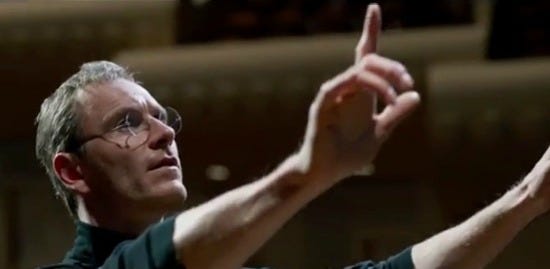Steve Jobs

"Steve Jobs" is the second screenplay by Aaron Sorkin that peeks behind the fabricated legend of an Information Age titan and finds a small boy bearing many scars who lashes out at those around him. It's not quite on the level of the Oscar-winning "The Social Network," but even a half-step below is pretty rarefied territory.
Michael Fassbender plays the title role of Apple co-founder Jobs, a man who was equal parts visionary and bully. As one character points out to him, he couldn't write code or create circuit boards or really do much of anything practical, but was a master at getting those who could to synthesize products in dynamic new ways.
Jobs didn't believe in letting the customer tell you what they wanted; he would invent a need they didn't know they had, then construct a product and marketing bombardment to convince people to satisfy it.
Directed by Danny Boyle ("Slumdog Millionaire"), "Steve Jobs" is already being attacked as a largely fictional version of the man and those around him. I don't doubt that. Although based on the book by Walter Isaacson, a mostly friendly portrait in which Jobs willingly participated prior to his 2011 death, Sorkin conducted extensive interviews and research on his own, and has used the text as a mere springboard.
What we're seeing is less biography than cogitation.
Start with the story structure, which is divided into a three-act play format, each centered around pivotal product launches in Jobs' career: the Mac in 1984, the NeXT cube in 1988 and the iMac in 1998. Each time Jobs is visited by key people in his life, and spars with them, like Scrooge and his ghosts. They difference is that here the man rejects the lessons his interlocutors would impart.
There's a whole lot of big speeches and emotional tirades, always in the minutes leading right up to the moment Jobs is supposed to go on stage and wow the audience. Pretty amazing coincidence, that.
Some of what is put forward is pure bullshit. For instance, Jobs' marketing chief and majordomo, Barbara Hoffman (Kate Winslet), is shown putting out fires all three times, when she actually retired in 1995. And Jobs is shown as using the NeXT launch to springboard himself back into the Apple camp, when really that didn't happen until a decade later.
So keep in mind as you watch Jobs battling with co-founder and rare friend Steve Wozniak (Seth Rogen) or Apple CEO John Sculley (Jeff Daniels) that we're not seeing stuff that actually happened. These are Sorkin's words, not the real people's.
This is Hollywood-style high art here, folks: "Lying in order to impart a greater truth."
That's reflected by Fassbender in the title role, a sterling actor who does not resemble or sound like Jobs in the faintest. But it's still a whiz-bang performance, portraying a man of limitless imagination and stunted emotions. Here was a guy who denied the paternity of his daughter, Lisa, for years, allowing her and her mother to subsist on welfare while he became worth billions.
The movie is essentially a series of dialogues between Jobs and one other person. With each he has a different motivation and mindset, and that evolves over time along with events. He starts out friendly with Sculley, even seeing him as a father figure, but that changes when dad orchestrates his ouster from Apple. (Though, as the movie claims, it was a mutually assured destruction scenario.) For "Woz," there is affection tempered with resentment, each man recognizing and desiring qualities in the other they themselves lack.
Michael Stuhlbarg plays Andy Hertzfeld, a key figure in the early days of Apple, who is bullied and berated by Jobs but somehow attains a sort of geeky grace with time. The relationship with Hoffman is probably the deepest, as she seemed to be the one person in his life who didn't need anything from Jobs and could stand up to him without endangering her own position.
The face-offs with his daughter's mother (Katherine Waterston) are more rote than the others and therefore less interesting; we know how it's going to play out, with recriminations and eventual demands for money, and wait for them to pass. His interactions with Lisa probably best mirror reality: halted, fractured, but gradually moving toward warmth.
"Steve Jobs" reminds me of a phrase used in another context but pertinent here: "Fake but accurate." It's a remarkable film that gets to the essence of a person largely by making things up.
What a magnificent fib.



